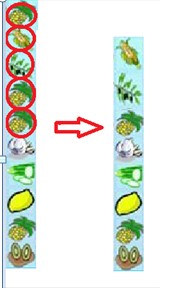LianLianKan
Time Limit: 2000/1000 MS (Java/Others) Memory Limit: 32768/32768 K (Java/Others)Total Submission(s): 1718 Accepted Submission(s): 537
Problem Description
I like playing game with my friend, although sometimes looks pretty naive. Today I invent a new game called LianLianKan. The game is about playing on a number stack.
Now we have a number stack, and we should link and pop the same element pairs from top to bottom. Each time, you can just link the top element with one same-value element. After pop them from stack, all left elements will fall down. Although the game seems to be interesting, it's really naive indeed.

To prove I am a wisdom among my friend, I add an additional rule to the game: for each top element, it can just link with the same-value element whose distance is less than 6 with it.
Before the game, I want to check whether I have a solution to pop all elements in the stack.
Now we have a number stack, and we should link and pop the same element pairs from top to bottom. Each time, you can just link the top element with one same-value element. After pop them from stack, all left elements will fall down. Although the game seems to be interesting, it's really naive indeed.

To prove I am a wisdom among my friend, I add an additional rule to the game: for each top element, it can just link with the same-value element whose distance is less than 6 with it.
Before the game, I want to check whether I have a solution to pop all elements in the stack.
Input
There are multiple test cases.
The first line is an integer N indicating the number of elements in the stack initially. (1 <= N <= 1000)
The next line contains N integer ai indicating the elements from bottom to top. (0 <= ai <= 2,000,000,000)
The first line is an integer N indicating the number of elements in the stack initially. (1 <= N <= 1000)
The next line contains N integer ai indicating the elements from bottom to top. (0 <= ai <= 2,000,000,000)
Output
For each test case, output “1” if I can pop all elements; otherwise output “0”.
Sample Input
2 1 1 3 1 1 1 2 1000000 1
Sample Output
1 0 0
需要加map判断下,否则超时。
#include<iostream>
#include<cstdio>
#include<cstring>
#include<map>
#include<cmath>
#include<vector>
#include<algorithm>
#include<set>
#include<string>
#include<queue>
#include <stack>
using namespace std;
#pragma warning(disable : 4996)
const int MAXN = 1010;
int num[MAXN];
bool visited[MAXN];
map<int, int>Map;
int dfs(int n)
{
int i, j;
while (n > 0 && visited[n])
{
n--;
}
if(n == 0)
{
return 1;
}
if(n == 1)
{
return 0;
}
i = 0;
j = n - 1;
while(i < 5)
{
if(j <= 0)
{
return 0;
}
if(visited[j])
{
j--;
continue;
}
if(num[n] == num[j])
{
visited[j] = true;
if(dfs(n-1) == 1)
{
return 1;
}
visited[j] = false;
}
j--;
i++;
}
return 0;
}
int main()
{
freopen("in.txt", "r", stdin);
int n, x;
bool flag;
map<int, int>::iterator it;
while (scanf("%d", &n) != EOF)
{
Map.clear();
for (int i = 1; i <= n; i++)
{
scanf("%d", &x);
num[i] = x;
Map[x]++;
}
if(n % 2 == 1)
{
printf("0\n");
continue;
}
flag = false;
for (it = Map.begin(); it != Map.end(); it++)
{
if(it->second % 2 == 1)
{
flag = true;
break;
}
}
if(flag)
{
printf("0\n");
}
else
{
memset(visited, false, sizeof(visited));
printf("%d\n", dfs(n));
}
}
return 0;
}